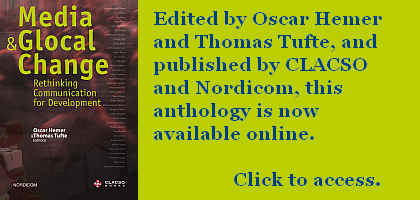Appropriation of ICTs by young women living in informal slums
This project component is grounded in Kenya and led by Grace Githaiga, PhD candidate at the Institute for Development Studies, University of Nairobi.
It is argued that differential access to, and unequal ability to use, the latest information and communication technologies (ICTs), could make developing countries even less competitive in the global economy, exacerbate inequality within countries, and deprive the poor of opportunities to improve their lives. Bridging the digital divide is, in this view, an urgent priority for the international community and for governments of developing countries.
Women are the keepers, transmitters, and re-creators of popular cultural traditions. But how active are they in terms of using contemporary technologies creatively in connection with those roles? And how active are young women in terms of coming together in a common platform through the use of ICTs to communicate their concerns or express their views of how they should be governed?
Participatory communication goes beyond a mere technology or series of methodologies, resources, or media. It implies a set of exchanges comprising a collective ‘word’ for naming people’s realities -a word that, by naming a denied and fragmented reality, makes it visible, identifiable, and meaningful.
Participatory media plays a significant role in the dissemination of information, knowledge sharing, networking and participatory empowerment. Participatory media are a subset of direct media distinct from the mass media. Direct media are smaller in scale, with a strong element in terms of choosing to participate or self-determination, and often enable feedback or exchange.
The project will explore if participation can allow an understanding of the real needs and priorities of young women needs, taking into account their language, traditions, beliefs and culture as well as their use of indigenous knowledge and expertise.
- Can contemporary technologies help build a foundation for young women’s participation in e-democracy?
- Can they allow young women to produce popular media along the lines of community radio listeners’ groups?
- How do civil society media engage young women in informal settlements?
- How do young women create groups in communication forums using social media?
- How do they get the information on governance issues, and how they in turn participate or engage in governance debates?
- Are decision-makers open to accepting new policy ideas from ordinary young women?
- How can young women in urban informal settlements benefit from access to ICTs and be empowered?
From a bottom up, community-based perspective, the project will focus on how young people in Kenya’s urban informal settlements experience, produce meaning and engage with civil society community media and communication initiatives. The purpose will be to understand how young women living in informal settlements participate in public debate through the study of Grassroots Organizations Operating Together in Sisterhood (GROOTS-Kenya), an organization based in Nairobi, and its Mathare Valley Pioneer Youth Group project, based in an urban informal settlement.
GROOTS-Kenya is a network of women’s self-help groups and CBOs among poor communities working with empowerment projects in Nairobi’s Mathare slum and in several rural areas spread across Kenya. Currently, the network focuses its efforts on governance, AIDS, disaster, secure tenure and post-conflict resolution.
For expected outputs and time frame, see MEDIeA’s project description.
